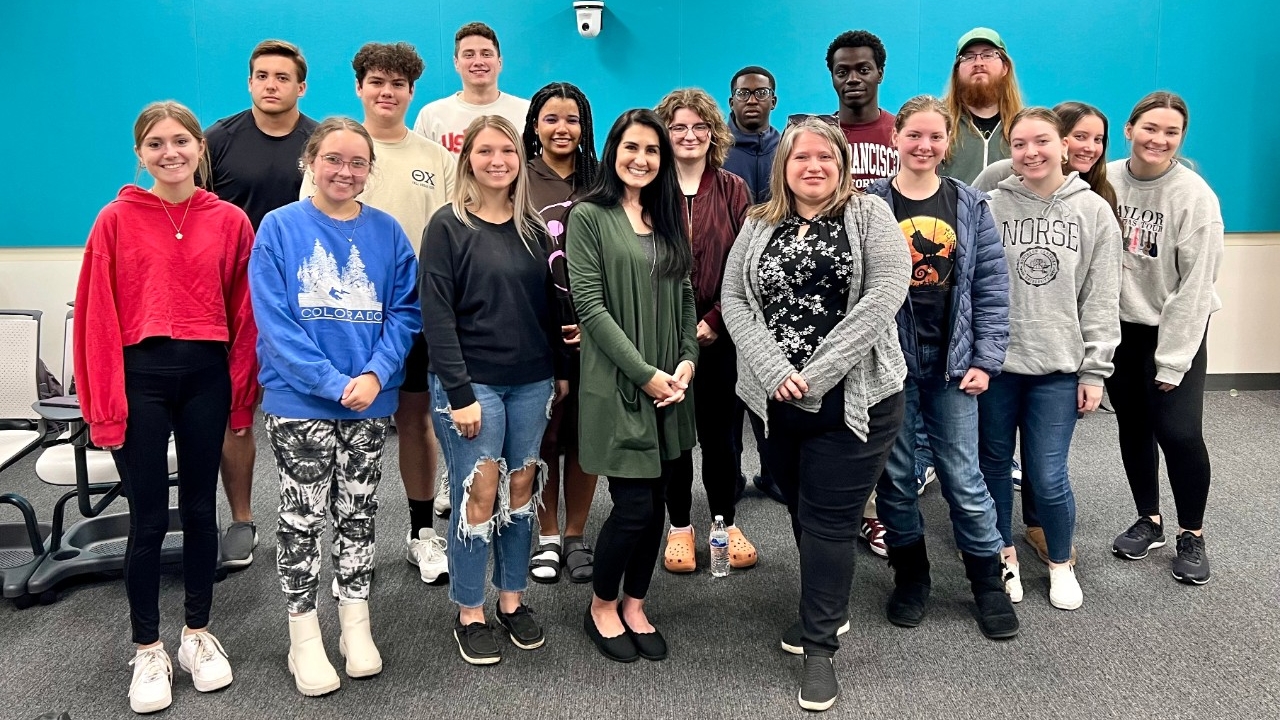
A student attending Dr. Katherina Nikzad-Terhune’s honors course shares that her family occasionally pokes fun at the massive font size her mother uses on her phone, two sentences sometimes filling the whole screen. Another recalls the many times their family has bemoaned the amount of time that young adults spend in front of screens. Technology can often be a point of friction between generations, and according to Dr. Terhune, this divide can largely be attributed to ageism in the tech industry, as well as society and culture.
“Less than 7 percent of the world was online in the year 2000,” she says. “When I was in high school, we used card catalogs and microfilm. Have any of you used those before?”
None of the students in attendance have.
“It’s a very different world now,” she adds. “At the start of the 2000s, there were more than 740 million cell phone subscriptions, globally. Now that number has surpassed the world’s population. We’ve talked about many forms of ageism in this class: hostile, benevolent and visual. Now, digital ageism is represented by prejudice from systematic biases that create age-related exclusion in technology, design and use.”
Titled “Unveiling Ageism: Understanding and Disrupting the Forgotten Discrimination,” Dr. Terhune’s course stemmed from her desire for NKU to offer more age-focused courses in addition to its gerontology micro-credential.
“It’s widespread and globally prevalent, but it is largely accepted and ignored. I thought this was a great opportunity to start introducing students to what ageism is and to help them see that it applies to them too."
“After I was given the opportunity to teach in the Honors College and began to develop different ideas about the courses I wanted to teach,” she says. “I got to thinking about the importance of teaching students about ageism through the lens that it is an often forgotten form of discrimination. It’s widespread and globally prevalent, but it is largely accepted and ignored. I thought this was a great opportunity to start introducing students to what ageism is and to help them see that it applies to them too.”
Terhune explains that though we often think of ageism as bias against older adults, the prejudice can go both ways. Some of her students who previously participated in accelerated college prep programs reported feeling alienated or singled out while taking university-level classes in high school. Others shared that their doctors dismissed complaints on account of their youth.
“It was really important to me for them to understand how it pertains to them and how it affects their future and well-being,” Terhune says. “My motivation was to change hearts and minds, and to give my students the awareness and tools to be disruptors of ageism.”
As part of one of the course’s major assignments, students were tasked with finding examples of ageism in popular culture—on TV, in music or on social media—and creating a presentation addressing how they might disrupt that bias to portray aging in a more positive light.
“It was really eye-opening that I would be browsing social media at home and find a lot of ageist content all the time, even when I wasn’t necessarily looking for information for our presentation,” Ella Cooper says. “I’m really into stand-up comedy, and I happened to see a TikTok video of John Mulaney and Nick Kroll talking about one of their skits in which they portray older adults. It was kind of benevolent ageism, which means they didn’t mean to be hostile about it, but it was still ageist content anyway.”
Students in Terhune’s course also acknowledged Ageism Awareness Day last month to help draw attention to what ageism is and the impact it has on individuals and communities.
By the end of the course, Terhune hopes that students will come away with a greater awareness of the ways they might perpetuate ageism in their own lives, which will equip them with the tools needed to enact change.
“It’s about a change of mindset,” says Ben Acuff. “It’s helped me talk to some of my friends about it and to call ageism out if I see it.”
In February 2020, NKU was named the first age-friendly university (AFU) in Kentucky by the Age-Friendly University Global Network. This distinction denotes that a university abides by 10 principles of age-friendly institutions, commits to age-friendly policies and contributes to a movement of benefit to students of all ages.
Created in 2012 by a team organized by Brían MacCraith, then the president of Ireland’s Dublin City University, the AFU network now includes more than 100 educational institutions from around the world.
“My colleagues, Dr. Allyson Graf, Dr. Suk-hee Kim, Amy Danzo, Sara Conwell, and I combined our efforts, wrote a proposal, and sent it to the university president’s office, where we received support,” Terhune says. “The year after we were awarded the distinction, we developed the NKU Age-Friendly University Coalition. We wanted to practice what we preach—not just earn the distinction and do nothing beyond that. We are a vibrant and active group of faculty and staff, students and community members with representation from departments and colleges across campus. We also involve multiple community partners, who inform us about the needs of the community, and we help inform them about the needs we have as a university. It's been a really beautiful partnership.”
Most recently, members of the coalition studied caregivers across campus, surveying faculty, staff and students who act in caregiver roles for a care recipient who might have a disability or disease. On Monday, Nov. 6, the coalition hosted its inaugural Caregiver Recognition Event and Resource Fair. Additionally, they’ve organized a series of talks through the Center for Teaching and Learning to help faculty better serve adult learners.
“Our goal is to be able to say, ‘here’s how we’re responding to the needs of all learners at NKU,’ each year,” Terhune says. “If we want to say that we’re truly age-friendly, then we need to be living that out.”